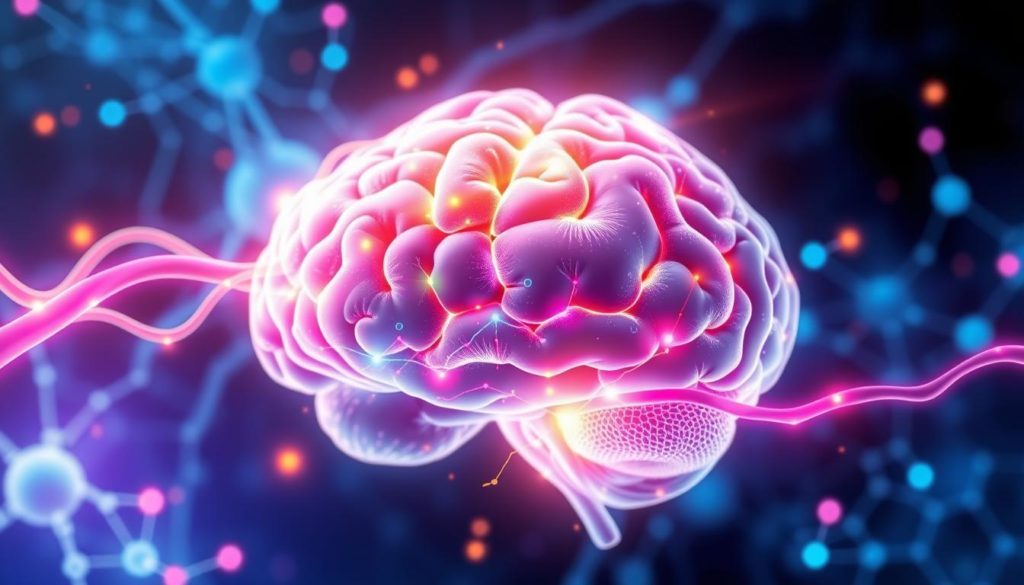Did you know that over 16 million prescriptions for stimulant drugs were filled in the United States in a single year? Among them, Methylphenidate and Phentermine are notable. They play big roles in treating ADHD and helping with weight loss.
It’s key to understand how Methylphenidate and Phentermine work and their effects. Methylphenidate is mainly for ADHD treatment. It helps many improve their focus and behavior. Phentermine, on the other hand, is used for short-term weight loss aid. It has shown significant success in managing obesity.
However, these stimulant drugs come with risks. Side effects and the chance for misuse are concerning. This highlights the need for professional guidance. Knowing more about Methylphenidate/Phentermine helps us recognize their benefits. At the same time, we stay aware of their possible downsides.
Introduction to Methylphenidate and Phentermine
Methylphenidate and Phentermine are key stimulant medications. They serve different purposes in healthcare. Methylphenidate is mainly for ADHD, and Phentermine helps with weight reduction.

Overview of Stimulant Drugs
Stimulant drugs like Methylphenidate and Phentermine boost alertness and energy. They meet various medical needs. This shows how flexible these drugs are in treating different issues.
History and Approval
The drug history of Methylphenidate and Phentermine is fascinating. Approved in 1959, Phentermine helps obese patients lose weight. Methylphenidate came next in the 1960s for ADHD.
Phentermine was once combined with fenfluramine, but that stopped for safety reasons. Now, it’s often used with topiramate. Meanwhile, Methylphenidate remains a top choice for ADHD. Doctors prescribe it carefully for long-term use.
Mechanism of Action
Understanding how Methylphenidate and Phentermine work gives us deep insights. Each drug affects the brain’s chemicals in different ways. This leads to their unique effects in treatments.

How Methylphenidate Works
Methylphenidate boosts dopamine and norepinephrine levels in the brain. This helps people with ADHD focus better and act less impulsively. It also increases dopamine and serotonin, improving brain function.
How Phentermine Works
Phentermine increases norepinephrine in a part of the brain called the lateral hypothalamus. This helps reduce hunger. It also slightly changes neurotransmitter levels, aiding in weight loss by boosting metabolism.
| Drug | Mechanism of Action | Primary Neurotransmitters | Therapeutic Effects |
|---|---|---|---|
| Methylphenidate | Inhibits dopamine and norepinephrine reuptake | Dopamine, Norepinephrine, Serotonin | Improves attention, reduces impulsivity in ADHD |
| Phentermine | Stimulates norepinephrine release, weak MAO inhibitor | Norepinephrine | Appetite suppression, increased resting energy expenditure |
Methylphenidat/Phentermine Combination Therapy
The idea of using both Methylphenidate and Phentermine together is getting attention. It’s for treating issues that need more than one method. Methylphenidate helps with ADHD, and Phentermine aids in weight loss. Together, they might tackle several problems at once.
Doctors should be careful with this combo. Combining them can be really helpful because they make each other work better. But, it might also cause extra side effects.
So far, there isn’t a lot of study on mixing Methylphenidate and Phentermine. But the research that’s out there looks good. Doctors should keep up with new guidelines and studies. This could change how we treat some complex health issues.
Uses for ADHD
Methylphenidate is key for ADHD care. It boosts thinking skills and helps control behavior. This medication is known for making people more focused and attentive. Because of this, many doctors choose it first for treatment.
Effectiveness in Treating ADHD
Many studies back Methylphenidate’s success. They show it really helps with paying attention and being less impulsive. Combining it with behavioral therapy is often the best approach. This way, treatment tackles both mind and behavior.
How It Compares to Other ADHD Medications
Methylphenidate is very effective, but looking at other options is good too. Phentermine has effects like Methylphenidate but isn’t officially approved for ADHD. It’s sometimes used, but Methylphenidate and therapy are the top choices.
Uses for Weight Loss
Phentermine is used to help with weight loss in people who are very overweight. It works by making you feel full, which means you eat less. This, along with exercise and eating better, can help you lose weight.
Effectiveness in Weight Management
Research shows that Phentermine can help with short-term weight loss. On average, people lose about 7.9 pounds more than without it. Also, many keep the weight off even after they stop taking Phentermine, especially if they keep up their new healthy habits.
Phentermine works great for losing weight but is different from Methylphenidate, which treats ADHD. Though both are stimulants, Phentermine is specifically for those struggling with being overweight. It helps them eat less by suppressing their appetite.
Dosage and Administration
Taking Methylphenidate and Phentermine the right way is key. This means following the doctor’s directions closely. It’s all about the right amount and how to take them, making the treatment work better.
Recommended Dosages
The right dosage forms for Methylphenidate change based on its type and what the patient needs:
- The immediate-release kind is usually taken 5mg to 20mg, two or three times a day.
- Extended-release is taken once a day, with amounts ranging from 18mg to 72mg.
Phentermine’s dosage also changes depending on the product:
- Doses are typically between 8mg and 37.5mg per day.
- Some types are split into doses to be taken through the day.
How to Take These Medications
Listening to your healthcare provider is crucial to avoid wrong use. Here’s what to remember:
- These meds come in tablets or capsules to be taken by mouth.
- Always take them as prescribed, ideally at the same time daily for steady levels in your body.
- Some need to be taken with food and others without, for the best effect and fewest side effects.
Below is a table comparing Methylphenidate and Phentermine’s dosages and how to take them:
| Medication | Dosage Forms | Typical Daily Dosage | Administration Routes |
|---|---|---|---|
| Methylphenidate | Immediate-release, Extended-release | 5mg – 72mg | Oral tablets, capsules |
| Phentermine | Tablets, Capsules | 8mg – 37.5mg | Oral tablets, capsules |
By following these guidelines, patients play a big role in their own health. It ensures they get the most from their medications without extra risk.
Potential Side Effects
Taking stimulants like Methylphenidate and Phentermine needs caution because of adverse reactions. Each medication requires knowing its drug safety profile. It’s key to watch their effects closely for tolerability.
Common Side Effects
Methylphenidate may cause insomnia, less hunger, and stomach pain. Phentermine, however, can raise blood pressure and cause heart issues. These usual side effects typically start early but often get better as your body adapts.
Serious Side Effects
Sometimes, Methylphenidate and Phentermine can cause severe adverse reactions. This includes psychosis and major heart problems. Handling these risks means regular doctor visits to detect problems early.
It’s crucial to track these meds’ drug safety profile closely. Ensuring safety means staying updated and doing continuous patient monitoring.
Interactions with Other Medications
Knowing how Methylphenidate and Phentermine work with other drugs is key. This knowledge prevents serious risks. Always talk with your doctor about all medicines you take to avoid harmful effects.
Common Drug Interactions
Methylphenidate and Phentermine can cause issues with other drugs. Some major concerns include:
- MAO inhibitors: Mixing these with the meds can cause dangerous blood pressure spikes.
- Antihypertensive agents: Blood pressure drugs might not work as well with these stimulants.
- Other CNS depressants: Using them together could greatly increase sedative effects and harm breathing.
Safety Precautions
Safety is crucial when taking these drugs. Important steps include:
- *Patient education* on drug interactions and what to avoid.
- Watching and reporting side effects quickly.
- Checking all medicines and supplements with your doctor to prevent bad interactions.
These safety actions lower the risks and ensure the treatment works well. They keep patients safe.
Conclusion
Methylphenidate and Phentermine are key for treating ADHD and managing weight. Each drug works in a special way. Methylphenidate improves focus in ADHD patients by controlling dopamine and norepinephrine. For more on how Methylphenidate works, see here. Phentermine helps with weight loss, tackling obesity effectively.
Understanding the side effects and interactions of these drugs is crucial. It helps doctors make informed choices for their patients. By keeping an eye on how patients react to the drugs, doctors can offer better care.
Using Methylphenidate and Phentermine wisely is important. Doctors need to keep checking on their patients. Working closely with patients ensures the best outcomes. This teamwork improves care for ADHD and obesity.
FAQ
What are the uses of Methylphenidate and Phentermine?
Methylphenidate is mainly for treating ADHD. It helps with focus and reduces impulsivity. Phentermine helps in short-term weight loss by making you less hungry if you’re obese.
How do Methylphenidate and Phentermine differ in their effects?
Methylphenidate boosts dopamine and norepinephrine concentrations in the brain. This manages ADHD symptoms. In contrast, Phentermine releases noradrenaline, which helps in weight loss by reducing appetite.
When were Methylphenidate and Phentermine approved for use?
Phentermine got FDA approval in 1959. Methylphenidate was approved in the 1960s.
Can Methylphenidate and Phentermine be used together?
Combining Methylphenidate and Phentermine has limited evidence. Healthcare providers should weigh the risks and benefits, considering potential synergistic effects and side effects.
How effective is Methylphenidate in treating ADHD?
Methylphenidate has proven to be effective in treating ADHD. It significantly improves focus and manages symptoms under medical supervision over time.
Is Phentermine effective for weight loss?
Yes, Phentermine has shown effectiveness in short-term weight loss for obese patients. Studies show it can lead to an average loss of 3.6 kg over placebo. It works by making you feel full and lowering calorie intake.
What are the recommended dosages for Methylphenidate and Phentermine?
Dosages for Methylphenidate depend on the form and the patient’s needs, including extended-release versions. Phentermine doses are from 8mg to 37.5mg daily, depending on the product.
What are the common side effects of Methylphenidate and Phentermine?
Methylphenidate’s common side effects are sleep problems, less appetite, and stomach pain. Phentermine can raise blood pressure, cause heart palpitations, and risk cardiovascular issues.
What are the serious side effects to be aware of?
Serious effects include Methylphenidate causing psychotic episodes or Phentermine leading to heart complications. These require immediate medical attention.
What are the common drug interactions with Methylphenidate and Phentermine?
These medications may interact with MAO inhibitors, blood pressure drugs, and CNS depressants. Tell healthcare workers about all medicines and supplements you use.
What safety precautions should be followed with these medications?
Stick to the dosages prescribed, avoid drugs that should not be combined, and get regular checks. This helps manage side effects and interactions well.


